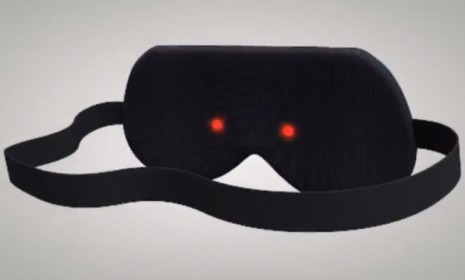The sleep mask that helps you control your dreams
Two Brooklyn inventors have sleep scientists and investors buzzing about a simple, affordable device that might enable lucid dreaming

A free daily email with the biggest news stories of the day – and the best features from TheWeek.com
You are now subscribed
Your newsletter sign-up was successful
The first step to controlling your dreams is to realize you're actually dreaming. And that's where the Remee sleep mask, a product developed by two Brooklyn inventors, comes in. Using an array of glowing lights, the mask gently reminds a user mid-dream that he or she is asleep, theoretically making it easier for the wearer to enter a lucid dreaming state. Here, a guide to the ambitious Kickstarter project that has investors dreaming big:
What exactly is lucid dreaming?
"Lucid dreaming refers to the act of being conscious while in a dream state — you're in a dream, but you know it," says Nitasha Tiku at BetaBeat. It's like "Inception without the corporate espionage." The practice goes way back — think Aristotle and Tibetan Buddhists — but the term itself was coined by Dutch psychiatrist Frederik van Eeden in the early 1900s. Lucid dreaming requires diligence to master. Scores of books, websites, forums, and specialized classes are devoted to teaching the practice. The goal with the Remee is to make achieving the state of awareness easier.
The Week
Escape your echo chamber. Get the facts behind the news, plus analysis from multiple perspectives.

Sign up for The Week's Free Newsletters
From our morning news briefing to a weekly Good News Newsletter, get the best of The Week delivered directly to your inbox.
From our morning news briefing to a weekly Good News Newsletter, get the best of The Week delivered directly to your inbox.
How does the mask work?
The sleep cycle is divided into two main stages that alternate throughout the night: Rapid Eye Movement (REM) sleep — where dreams typically occur — and non-REM sleep. The Remee mask has six red LED lights that glow and blink when a user enters the night's deepest REM phase — all without waking you up. The idea is that "if you're in REM sleep the lights will bleed into your dreams, presenting a perfect chance to become lucid."
Who thought this up?
The $95 Remee mask is the brainchild of Duncan Frazier and Steve McGuigan, two Brooklyn-based inventors who revealed their idea on Kickstarter. The team came up with the concept when they realized that other dream masks were bulky, uncomfortable, and really expensive. (A similar mask developed in 1993, called the NovaDreamer, still costs upwards of $600.) Originally, the duo's goal was to raise $35,000, but would-be investors perked up, and Frazier and McGuigan now have more than $570,000 to work with.
A free daily email with the biggest news stories of the day – and the best features from TheWeek.com
Okay. But does it really work?
Remee's inventors makes no promises. But for someone who wants to overcome a recurring nightmare, the sleep mask could prove valuable. "Gimmick? Perhaps," says DJ Pangburn at Death and Taxes. "Cool in a psychedelic science fiction way? Absolutely."
Sources: BetaBeat, Death and Taxes, Kickstarter, RedOrbit, RT.com
-
 Political cartoons for February 3
Political cartoons for February 3Cartoons Tuesday’s political cartoons include empty seats, the worst of the worst of bunnies, and more
-
 Trump’s Kennedy Center closure plan draws ire
Trump’s Kennedy Center closure plan draws ireSpeed Read Trump said he will close the center for two years for ‘renovations’
-
 Trump's ‘weaponization czar’ demoted at DOJ
Trump's ‘weaponization czar’ demoted at DOJSpeed Read Ed Martin lost his title as assistant attorney general